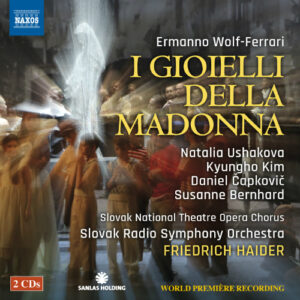Composer of a bunch of chamber music as well as 15 operas, most of which are comic, the half-German, half-Italian Ermanno Wolf-Ferrari is rarely heard from today. His comic works, coming from the buffo tradition of Goldoni, are well regarded, but somewhere near the middle of his career—in 1911, to be exact—he decided to throw his hat into the ring occupied by Mascagni, Leoncavallo, and the other verismo composers. The result is I Gioielli della Madonna, a quasi-pile of crap of an opera that is so over-orchestrated and over-populated (there are almost 30 solo roles) that even when you sit back and realize the skill with which many of the ensembles are put together—Wolf-Ferrari’s sense of counterpoint is almost too fine for such direct brutality—it offers little pleasure.
The plot—as loaded as a twice baked, bacon-filled, cheesy potato—is set in Naples at the time of the opera’s composition. Gennaro, a blacksmith, is hot for Maliella, his low-born foster sister (whom his mother, Carmela, took in as penance when Gennaro, ill as a child, was saved), who finds his attention to her ridiculous and lets him know it. She’s intrigued by Rafaele, the head of the local Camorra (a Mafia-type group), and he desperately wants her because 1) she is wild and arrogant, and 2) she is a virgin.
Rafaele offers Maliella the jewels that hang around the Madonna’s neck in the local church, but even Maliella can’t accept such sacrilege; she can, however, tell Gennaro about Rafaele’s offer, which drives him to steal them. Maliella and Rafaele share a hot love duet, after which Gennaro shows up with the jewels, and Maliella, still thinking dirty thoughts about Rafaele, gives in to Gennaro. Since her “flower” is now gone, Rafaele disowns her and she drowns herself. In a fit of insane religious ecstasy Gennaro prays for forgiveness and stabs himself.
Two of the duets are fine and melodic—oases in the midst of a lot of chaos and local color; but mostly there are peasant choruses, religious choruses, and children’s choruses, along with a Tarantella and Bacchanale, between the beginning and end of the opera, most of which takes place out-of-doors so we can meet the neighbors and local thugs. Religious fervor hangs over the work like a shroud, but Cavalleria and Suor Angelica do it better. There is a xylophone and there are mandolins, but none of the inexorable catastrophe that permeates the best of verismo.
Despite a poorly balanced recording, this set will be welcomed by fans of Wolf-Ferrari and those with a curiosity about this work. Conductor Friedrich Haider keeps excitement high, even when the plot walks away and is merely commented on by every Tomasso, Riccardo, and Enrico in Naples. The tension remains high despite an inherent inability to care about the slutty, confused Maliella, the insane Gennaro, or the nasty Rafaele.
Natalia Ushakova’s cutting-edge top and darkish, Tosca-like tone is just right for Maliella, and she chews up the text, smolders, and soars over the orchestra. It’s a big sing and Ushakova impresses. Tenor Kyungho Kim sings steadily and is well able to express Gennaro’s one dimension; his final, loony scene in front of the Madonna is finely played. The role of Rafaele really needs a steadier—and darker—baritone than Daniel Capkovic possesses. He’s a nastier guy than Alfio in Cavalleria, but Capkovic sings without much authority or menace. Susanne Bernhard is a voice of reason and niceness as Carmela, Gennaro’s mother, in their one duet. You’ll know if you need this.
































